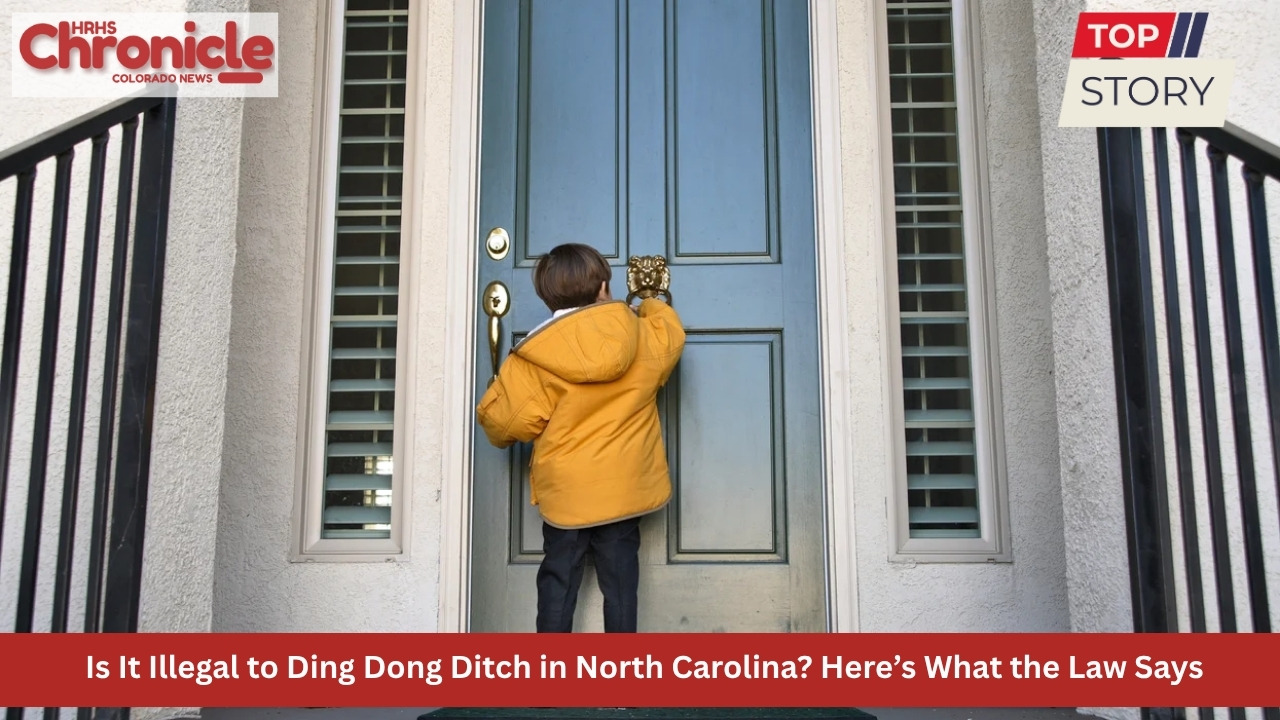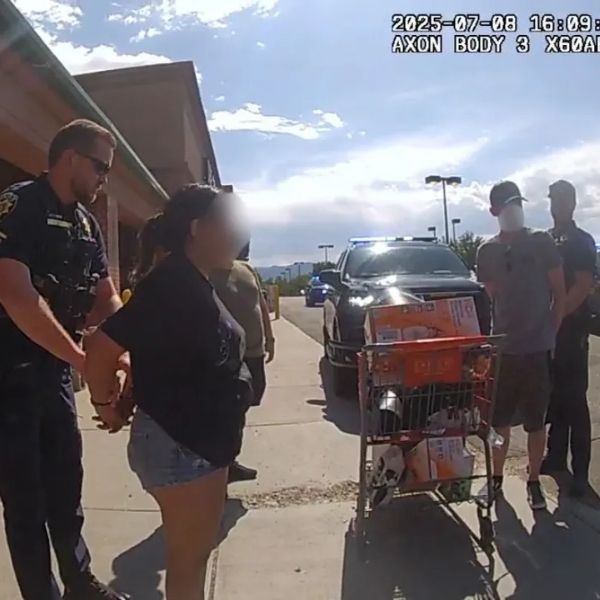North Carolina (hrhsnews.org) – Ding dong ditch, sometimes called “knock and run,” is a playful prank where someone rings a doorbell or knocks, then swiftly flees before the homeowner answers. Though this stunt is often associated with teenagers seeking a harmless thrill, it can cross legal boundaries—especially when it disturbs residents or leads to confrontations in neighborhoods across North Carolina.
Ding Dong Ditch: Harmless Prank or Serious Offense?
In many parts of North Carolina, particularly in cities like Raleigh, Charlotte, Greensboro, Asheville, and Wilmington, ding dong ditch has been a neighborhood nuisance for decades. Homeowners report feeling startled or annoyed, especially when pranks repeat during the night or target the same home multiple times. What some view as simple mischief can be perceived as harassment or invasion of privacy, drawing the attention of law enforcement.
The Legal Perspective: Trespassing Laws in North Carolina
The legality of ding dong ditch revolves mostly around North Carolina’s trespassing laws. The state recognizes two primary trespass charges: first-degree and second-degree trespass.
-
First-Degree Trespass: This offense occurs when someone enters or remains on a property that is clearly enclosed or secured—such as a fenced yard in Charlotte’s Myers Park or a locked backyard in Durham—without permission. If you ring the bell at a home with locked gates or posted no-trespassing signs, you may be at risk of this more serious charge. First-degree trespass is typically a Class 2 misdemeanor, punishable by up to 60 days in jail and a fine that can reach $1,000.
-
Second-Degree Trespass: This is a less severe charge and generally applies when someone enters or remains on property after being told not to, or when “no trespassing” signs are posted. Police may overlook a single, one-off prank in a Greensboro suburb, but repeated return visits—especially after warnings by a homeowner—can prompt an arrest for second-degree trespass. This is charged as a Class 3 misdemeanor, with a maximum penalty of 20 days in jail and a $200 fine.
Several North Carolina law firms report cases where ding dong ditchers were charged with trespassing, especially when the prank became persistent or escalated beyond a single incident. Cases in Raleigh, Cary, and Wilmington highlight that law enforcement can—and sometimes will—press charges against repeat offenders, especially if pranks occur late at night or result in residents feeling unsafe.
Homeowner Reactions and When Pranks Go Too Far
News stories in cities like Charlotte and Fayetteville have detailed how residents have responded with everything from video doorbells to direct confrontations. In rare but high-profile cases, pranks resulted in physical altercations or emergency police calls, sometimes ending with young pranksters detained and facing minor charges.
For example, in one Asheville neighborhood, local police responded to a report of multiple ring-and-run incidents over a single week. Children were warned and sent home to their parents; further incidents would have likely resulted in misdemeanor trespass charges.
The Role of Intent: Is a Prank Just a Prank?
Intent is a crucial factor in North Carolina’s trespassing laws. Someone wandering onto a porch by mistake is less likely to face charges than someone who deliberately ignores “No Trespassing” signs or returns after being told to leave. Ding dong ditch typically involves intent; the prankster knowingly approaches private property to perform a disruptive act, even if their aim is to have fun.
Neighborhood Differences: Rural vs. Urban North Carolina
How the law is enforced may depend on the location. In urban areas like Charlotte, Raleigh, or Winston-Salem, homeowners are more likely to have surveillance cameras and to contact police if disturbed. In smaller communities, such as those in the Outer Banks or mountain towns like Boone, police might deal with the situation informally—giving warnings or calling parents.
However, rural homeowners also have rights, and in some cases may be quicker to act if their privacy is threatened, especially after dark or if property damage occurs.
Potential for Additional Charges: Disorderly Conduct and Beyond
While trespassing remains the main concern, ding dong ditch could also be classified as disorderly conduct in certain circumstances. If the prank incites panic, disrupts the peace, or leads to a confrontation, a disorderly conduct charge is possible.
In severe cases, particularly those involving destruction—such as breaking a doorbell in Durham or damaging a porch in Wilmington—additional charges like vandalism or injury to personal property may apply. North Carolina treats vandalism seriously; damaging property is often charged as a misdemeanor with fines or community service assigned.
Ding Dong Ditch and Technology
Today, the popularity of video doorbells and surveillance systems has dramatically changed the landscape. In cities like Charlotte, Raleigh, and Greensboro, if you run up to a door and dash, odds are you’ll be recorded—sometimes with high-definition footage. Evidence of multiple incidents can be turned over to police, making identification, apprehension, and prosecution much easier.
Homeowners can use footage to show persistent harassment, giving law enforcement a stronger basis for citing trespassing or disorderly conduct.
The Statute on Trespass
North Carolina’s laws define trespassing as entering or remaining on another’s property without authorization. The law does not require a “No Trespassing” sign for a person to be charged, and intent to commit an act (like prank ringing) is a key factor. After being told not to return, returning may result in a higher degree of trespass and stiffer penalties.
What Can Happen if You Get Caught?
Consequences for ding dong ditching vary. Most first-time adolescent offenders may only receive a warning, especially if there is no property damage and no prior complaints. Persistent or aggressive actions—multiple pranks or confrontations with the homeowner—raise the risks considerably.
A first-degree trespass is more serious, subjecting offenders to larger fines and potential jail time, though most youth are not prosecuted to the fullest extent, particularly on a first offense. Parents may be notified, and police may require a meeting or apology to the homeowner.
In rare cases, if the prankster causes injury or property damage, or if the encounter leads to a police pursuit or emergency call, charges may escalate. Destruction of doorbells or outdoor lights could be prosecuted as vandalism, increasing fines and risk of juvenile court intervention.
What Should Parents and Teens Know?
Parents should educate their children on the importance of respecting private property and understanding legal boundaries—especially in neighborhoods where property lines may not be clear to youth. It’s vital to teach children not only about respect, but about the real legal consequences and personal risks of pranks gone too far. This is especially important in cities such as High Point or Cary, where community watch programs and active neighborhood policing lead to prompt action when property crimes—even those perceived as minor—are reported.
Exploring the Gray Areas
While North Carolina law provides clear statutes for trespassing, some scenarios fall into a gray area. A single, polite knock in broad daylight may be overlooked, but repeated actions, confrontations with homeowners, or incidents at night can quickly transition a prank from minor mischief into misdemeanor territory.
Key Points to Remember
-
Ding dong ditching can be illegal, particularly if it involves second-degree or first-degree trespassing under state law.
-
First-degree trespass applies to entering secured or marked property without permission.
-
Second-degree trespass can be charged if you ignore signs or direct warnings.
-
Most cases end with a warning, but persistence or escalation may lead to fines or even jail time.
-
Use of doorbell or property-damaging tactics can elevate the offense to vandalism.
-
Technology makes it easy for homeowners and police to identify those who trespass.
Conclusion
Ding dong ditch may seem like “just a joke,” especially in childhood memories or coming-of-age stories from towns like Winston-Salem, Chapel Hill, or Wilmington, but the reality is more complicated in today’s legal environment. North Carolina takes both property rights and public safety seriously. Residents, especially in fast-growing cities, expect the same.
Educating youth about the law, respecting neighbors, and understanding local regulations can save families from disruption and unintended consequences. The next time a doorbell rings unexpectedly in Raleigh or Charlotte, let it be for a friendly hello—not a legal headache.

Mrs. Odice has been a teacher here for 9 years. She likes yoga and spends most of her time with her 3 kids. She also grew up going to Douglas County schools and is Canadian.















Leave a Reply